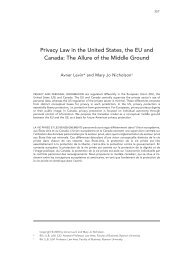Commentary on Fichte's “The Illegality of the Unauthorised ... - uoltj
Commentary on Fichte's “The Illegality of the Unauthorised ... - uoltj
Commentary on Fichte's “The Illegality of the Unauthorised ... - uoltj
You also want an ePaper? Increase the reach of your titles
YUMPU automatically turns print PDFs into web optimized ePapers that Google loves.
(2008) 5:1&2 UOLTJ 141<br />
<str<strong>on</strong>g>Commentary</str<strong>on</strong>g> <strong>on</strong> Fichte 181<br />
15. Auch diese Begriffe zeigen sich in<br />
allgemein angenommenen Maximen.<br />
Warum wird selbst der rechtmäßige<br />
Verleger allgemein getadelt, wenn<br />
er eine größere Anzahl Exemplare<br />
abdrucken läßt als er mit dem Verfasser<br />
verabredet hat? Das Recht des Verfassers<br />
dies zu hindern, gründet sich zwar auf<br />
einen K<strong>on</strong>trakt, der aber nicht über das<br />
Eigenthum, s<strong>on</strong>dern den Nießbrauch<br />
abgeschlossen ist. Der Verleger<br />
kann höchstens Eigenthümer dieses<br />
Nießbrauchs heißen. — Warum dann,<br />
wenn er eine zweite Auflage besorgt,<br />
ohne Erlaubniß des Verfassers? Wie kann<br />
der Verfasser, bei einer zweiten Auflage,<br />
auch wenn er nichts Neues hinzusetzt<br />
noch umarbeitet, v<strong>on</strong> neuem H<strong>on</strong>orar<br />
vom Verleger für die bloße Erlaubniß<br />
der neuen Auflage fordern? Wären<br />
diese Maximen nicht widersprechend,<br />
wenn man annähme, daß das Buch ein<br />
Eigenthum des Verlegers würde, und nicht<br />
beständiges Eigenthum des Verfassers<br />
bliebe, so daß der Verleger fortdaurend<br />
nichts ist als sein Stellvertreter?<br />
Wäre es nicht widersprechend, daß<br />
das Publikum, wenn es, durch einen<br />
prächtigen Titel getäuscht, ein Buch<br />
gekauft hat, in welchem es nichts als das<br />
Längstbekannte, aus den bekanntesten<br />
Büchern ärmlich zusammengestoppelt<br />
findet; an den Verfasser des Buchs Regreß<br />
nimmt, und nicht an seinen Verleger sich<br />
hält? Ein Recht uns zu beklagen, haben<br />
wir allerdings; wir wollten nicht bloß<br />
ein paar Alphabete gedrucktes Papier,<br />
wir wollten zugleich die Möglichkeit<br />
erkaufen, uns über gewisse Gegenstände<br />
zu belehren. Diese ward uns versprochen,<br />
und nicht gegeben. Wir sind getäuscht,<br />
wir sind um unser Geld. Aber gaben wir<br />
dies nicht dem Verleger? War er es nicht,<br />
der uns das leere Buch dagegen gab?<br />
Warum halten wir uns nicht an ihm, als an<br />
dem letzten Verkäufer, wie wir es s<strong>on</strong>st<br />
bei jedem Kaufe thun? Was sündigte<br />
15. These ideas also appear in generally<br />
accepted maxims. Why is even <strong>the</strong> legal<br />
publisher criticized when he allows a<br />
greater number <strong>of</strong> copies to be printed<br />
than he had agreed with <strong>the</strong> author?<br />
The right <strong>of</strong> <strong>the</strong> author to prevent this<br />
is indeed founded <strong>on</strong> a c<strong>on</strong>tract, which,<br />
however, is not c<strong>on</strong>cluded with regard<br />
to ownership, but ra<strong>the</strong>r with regard<br />
to use. The publisher can at most be<br />
c<strong>on</strong>sidered <strong>the</strong> owner <strong>of</strong> <strong>the</strong> usufruct.<br />
And what about when <strong>the</strong> publisher<br />
issues a sec<strong>on</strong>d editi<strong>on</strong> without <strong>the</strong><br />
permissi<strong>on</strong> <strong>of</strong> <strong>the</strong> author? How can <strong>the</strong><br />
author, when he does not add anything<br />
new or re-work <strong>the</strong> original manuscript,<br />
demand additi<strong>on</strong>al m<strong>on</strong>ey from <strong>the</strong><br />
publisher merely for granting permissi<strong>on</strong><br />
for a new editi<strong>on</strong>? Would not <strong>the</strong>se<br />
maxims be c<strong>on</strong>tradictory if <strong>on</strong>e were<br />
to assume that <strong>the</strong> book becomes <strong>the</strong><br />
property <strong>of</strong> <strong>the</strong> publisher, and did not<br />
remain a c<strong>on</strong>tinuing possessi<strong>on</strong> <strong>of</strong> <strong>the</strong><br />
author, such that <strong>the</strong> publisher is nothing<br />
o<strong>the</strong>r than his representative? Wouldn't<br />
it be c<strong>on</strong>tradictory if <strong>the</strong> public, when<br />
it buys a book under a magnificent title<br />
and finds in it nothing but well-known<br />
ideas poorly compiled from <strong>the</strong> most<br />
well-known books, is disappointed and<br />
blames <strong>the</strong> author <strong>of</strong> <strong>the</strong> book ra<strong>the</strong>r<br />
than <strong>the</strong> publisher? Of course we have<br />
<strong>the</strong> right to complain. We did not want<br />
mere paper printed with letters, but<br />
ra<strong>the</strong>r, we wanted to buy <strong>the</strong> possibility<br />
<strong>of</strong> being instructed about particular<br />
subjects. This is what was promised to<br />
us and was not provided. We have been<br />
deceived, and we have been swindled<br />
<strong>of</strong> our m<strong>on</strong>ey. But did we not pay this<br />
m<strong>on</strong>ey to <strong>the</strong> publisher? Was not it he,<br />
who gave us <strong>the</strong> empty book? Why do<br />
we not seek redress from him, as <strong>the</strong><br />
most recent seller, as we would in <strong>the</strong><br />
case <strong>of</strong> any o<strong>the</strong>r purchase? [232] How<br />
was <strong>the</strong> poor author at fault? This is how<br />
we would necessarily be obliged to think









